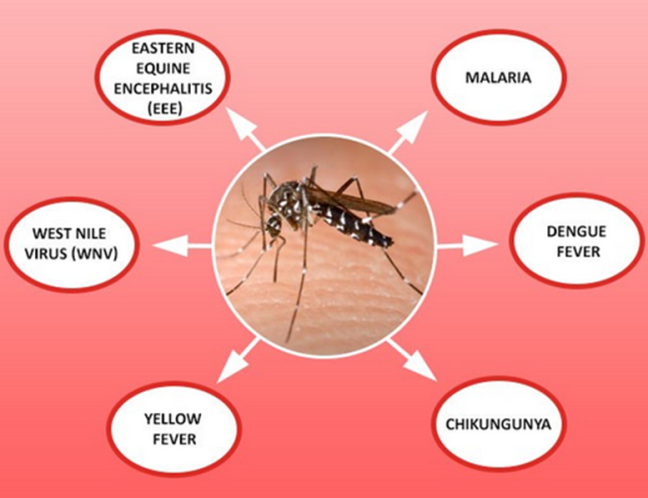Problem Statement
Mosquitoes are disease vectors existing as an ectoparasite health hazard to communities worldwide. Malaria and Zika are spread via blood transmission by mosquito bites with possible secondary complications, including allergic reactions and bacterial infections. Integrated Pest Management (IPM) is a program that seeks to combat the issue with biological, chemical, and physical methods. In the context of IPM, researchers propose to use Diethyltoluamide (DEET) (C12H17NO), a synthetic compound introduced in the 21st century, and other insect repellents in contrast to the previously used Dichlorodiphenyltrichloroethane (DDT) which could cause the development of species resistance and adverse effects on people (Suckling et al., 2013). In this research brief, the recent study “Indoor Residual Spraying with Microencapsulated DEET Repellent (N, N-Diethyl-M-Toluamide) for Control of Anopheles Arabiensis and Culex Quinquefasciatus” by Kitau et al. (2014) is reviewed.
Today, the goal is not only to cope with mosquitoes but also to guarantee the protection for persons according to the Healthy People 2020 environment-oriented goal: “EH-3.3: Reduce the risk of adverse health effects caused by major sources of airborne toxics” (Office of Disease Prevention and Health Promotion, 2017, para. 10).
Introduction and Purpose of Research
Different classes of chemicals used for indoor residual spraying have various effects on insects and people in terms of guaranteeing mosquito mortality or provoking allergies. In their study, Kitau et al. (2014) focused on examining the appropriateness of using Microencapsulated (MC) DEET for indoor residual spraying in order to cope with mosquitos while increasing their mortality and preventing malaria transmission because previous studies provided the findings only regarding the use of DEET MC for nets. The researchers were interested in the effects of sprays on An. arabiensis and Culex quinquefasciatus.

Study Design and Methods
The effectiveness of DEET MC was tested in contrast to examining the efficacy of traditional repellents and specific non-repellent insecticides. The trail was organized in the field station of Kilimanjaro Christian Medical University College in Tanzania.
The focus was on conducting the trial in six different huts while using such substances as DEET MC, DDT, lambdacyhalothrin, pirimiphos-methyl, and permethrin. The substances were sprayed on specific panels used to assess the efficacy of a certain compound. The resistance tests were conducted before starting on the trial. Volunteers slept in the huts, and the substances were used during 19:30-6:30 hours. In the morning, the results regarding the number of collected mosquitos were documented for further analysis.
Statistics and Findings
The researchers were interested in examining mosquito mortality rates and the proportion of blood-fed rates. The data were analyzed with the help of Stata® 10 and a logistic regression tool. It was found that the mortality of An. Arabiensis was higher without depending on a certain treatment (range: 76-86%).
The mortality of An. arabiensis in huts where DEET was sprayed was higher (82%, P = 0.043) than in huts where lambdacyhalothrin was sprayed. DEET was less effective against Culex quinquefasciatus where the mortality was only 29%. There were also no significant decreases in blood-feeding associated with using DEET against An. arabiensis and Culex quinquefasciatus.
Conclusion
DEET MC is potentially a good compound to cope with An. arabiensis while increasing the mortality rate and protecting people without affecting their health and provoking allergies. However, this insecticide is not effective to reduce the mortality of Culex quinquefasciatus.
Critique
The study is effective to provide reliable and valid results regarding the efficacy of DEET MC against An. arabiensis and Culex quinquefasciatus because of the researchers’ focus on conducting an appropriately organized trial. The study has limitations only in terms of the location and samples selected for the research. Additional studies in different locations with the focus on other mosquitos are expected.
References
Kitau, J., Oxborough, R., Matowo, J., Mosha, F., Magesa, S. M., & Rowland, M. (2014). Indoor residual spraying with microencapsulated DEET repellent (N, N-diethyl-m-toluamide) for control of Anopheles arabiensis and Culex quinquefasciatus.Parasites & Vectors, 7(1), 446-456. Web.
Office of Disease Prevention and Health Promotion. (2017). Healthy People 2020: Environmental health. Web.
Suckling, D. M., Stringer, L. D., Stephens, A. E., Woods, B., Williams, D. G., Baker, G., & El-Sayed, A. M. (2013). From integrated pest management to integrated pest eradication: Technologies and future needs. Pest Management Science, 70(2), 179-189. Web.